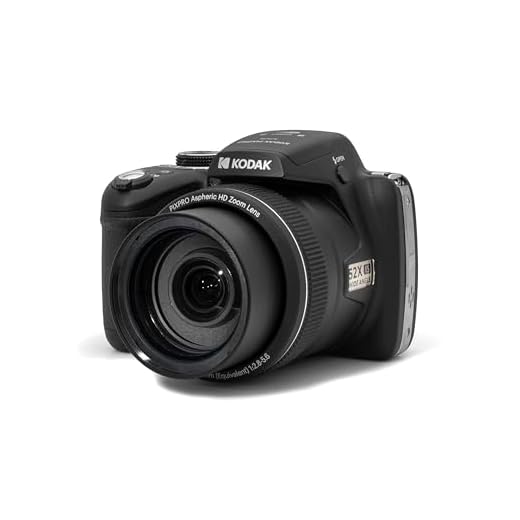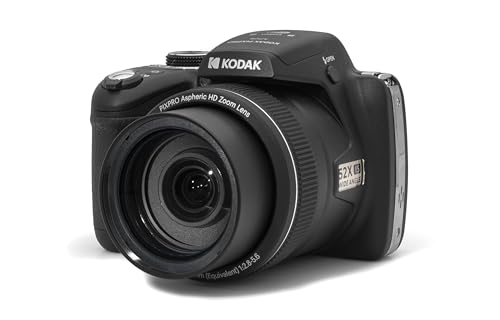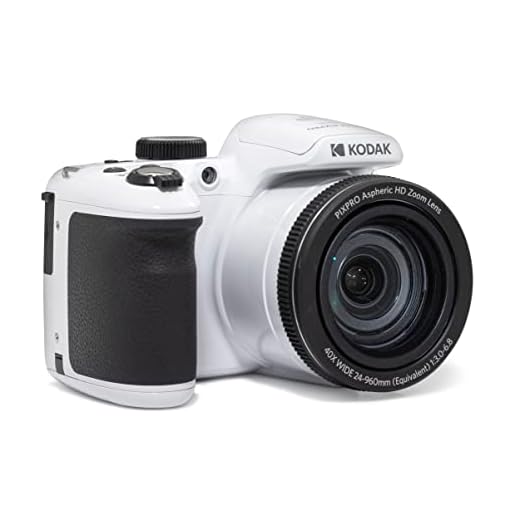



Optical zoom is an essential feature to consider when purchasing a digital camera. It determines how much the camera lens can magnify a subject, providing a closer view without sacrificing image quality. With so many options available, it can be challenging to determine what the best optical zoom is for a digital camera.
The best optical zoom for a digital camera depends on your specific needs and preferences. For those who enjoy capturing distant objects, a camera with a higher optical zoom is recommended. This allows you to get closer to your subject without compromising image resolution.
When choosing a camera, you’ll often come across a number such as 10x, 20x, or even 50x optical zoom. This number represents the camera’s maximum magnification capability compared to its widest setting. The higher the number, the more detail you’ll be able to capture from a distance.
However, it’s important to note that a higher optical zoom doesn’t always guarantee better image quality. Other factors like the camera’s sensor size, image stabilization technology, and lens quality also play a significant role in determining the overall image clarity. Therefore, it’s crucial to consider these factors as well when choosing a camera with an optical zoom.
In conclusion, the best optical zoom for a digital camera ultimately depends on your photography needs and the quality of the camera components. While a higher optical zoom can offer a closer view, make sure to consider other features and features that can affect image quality as well.
The Importance of Optical Zoom
Optical zoom is a crucial feature to consider when choosing a digital camera. Unlike digital zoom, which simply enlarges the image digitally, optical zoom utilizes the camera’s lens to bring the subject closer, resulting in higher quality images.
With optical zoom, you can capture details from a distance without sacrificing image quality. Whether you’re photographing wildlife, sports events, or landscapes, having a powerful optical zoom allows you to capture the action and bring it closer to the viewer.
Optical zoom is especially useful in situations where you cannot physically get close to your subject. For example, if you’re photographing a subject that is far away or inaccessible, using optical zoom enables you to get a clear shot without any loss of detail.
In addition to its practical uses, optical zoom also allows for more creativity in your photography. By zooming in or out, you can experiment with different perspectives and compositions, creating unique and interesting images.
When comparing digital cameras, pay attention to the optical zoom range. A higher zoom range, such as 10x or 20x, provides greater flexibility in capturing a wide range of subjects. However, keep in mind that higher zoom ranges may also result in larger and heavier cameras.
Ultimately, the importance of optical zoom cannot be overstated. It is a key feature that enhances your photography by allowing you to capture distant subjects with clarity and detail. So, when choosing a digital camera, make sure to prioritize optical zoom for a versatile and rewarding photography experience.
Understanding the Need for Optical Zoom
When it comes to choosing a digital camera, one of the most important features to consider is the optical zoom. Optical zoom refers to the camera’s ability to magnify the image without compromising its quality. Unlike digital zoom, which simply enlarges the pixels, optical zoom uses the lens to physically zoom in, resulting in a clearer and sharper image.
Having a high-quality optical zoom on your camera is especially important if you enjoy capturing distant subjects. Whether you’re photographing wildlife, sports events, or landscapes, a powerful optical zoom will allow you to get closer to your subject and capture the details in all their glory.
Not only does optical zoom enable you to take better photos from a distance, but it also gives you more flexibility in framing your shots. With a greater zoom range, you can compose your images more creatively, creating a sense of depth and perspective. This is particularly useful in portrait photography, where you want to blur the background and focus on the subject, or in macro photography, where you want to capture intricate details of small objects.
Furthermore, optical zoom plays a crucial role in ensuring image quality. When you use digital zoom, the camera essentially crops the image and enlarges the remaining pixels, resulting in a loss of detail and a grainy appearance. On the other hand, optical zoom maintains the image’s resolution and sharpness, producing higher-quality photos even when zoomed in.
In summary, optical zoom is an essential feature for any digital camera enthusiast. It allows you to capture distant subjects with clarity and precision, while also expanding your creative possibilities. So, when choosing a camera, be sure to prioritize a powerful optical zoom to enhance your photography experience.
Benefits of Optical Zoom over Digital Zoom
When it comes to zoom capabilities, optical zoom is often considered superior to digital zoom. Optical zoom uses the camera’s lens to physically magnify the image, allowing you to get closer to the subject without sacrificing image quality. On the other hand, digital zoom relies on software interpolation to enlarge the pixels, resulting in a loss of image clarity and detail.
Here are some benefits of optical zoom that make it a preferred choice for many photographers:
Image Quality
Optical zoom produces higher quality images compared to digital zoom. By using the camera’s lens to zoom in, the optical zoom maintains the original resolution of the image, resulting in sharper details and better overall image quality. Digital zoom, on the other hand, enlarges the existing pixels, leading to a decrease in resolution and the appearance of pixilation.
Longer Reach
Optical zoom allows you to get closer to your subject even when they are far away. With a camera featuring a powerful optical zoom lens, you can capture clear and detailed shots of subjects that are at a distance, such as wildlife, sports events, or even objects in the night sky. Digital zoom, on the other hand, can only enlarge the existing image, limiting the reach and making it difficult to maintain image clarity at longer distances.
Flexibility
Optical zoom provides more flexibility in composing your shots. By adjusting the zoom level, you can frame your subject exactly the way you want, whether you want a wider view or a close-up shot. Optical zoom lenses offer a range of focal lengths, allowing you to capture a variety of perspectives and create diverse compositions. Digital zoom, being a software-based enlargement, does not offer the same level of control and flexibility in shot composition.
In conclusion, optical zoom offers several advantages over digital zoom. It produces higher quality images, allows you to capture distant subjects with clarity, and provides more flexibility in composing your shots. When choosing a digital camera, consider the optical zoom capabilities to ensure you have the best tools for capturing stunning images.
Choosing the Right Optical Zoom
When it comes to choosing a digital camera, one of the most important factors to consider is the optical zoom. The optical zoom determines how close you can get to your subject without sacrificing image quality. It allows you to capture distant objects with clarity and detail.
There are various optical zoom ranges available on the market, ranging from 2x to 50x or even higher. The best optical zoom for you will depend on your specific needs and preferences.
If you often find yourself photographing subjects from a distance, such as wildlife or sports events, a camera with a higher optical zoom range would be ideal. A zoom lens with a range of 20x or higher would allow you to capture clear and detailed images even from a distance.
On the other hand, if you primarily use your camera for everyday photography or capturing subjects at close range, a camera with a lower optical zoom range would be sufficient. A zoom lens with a range of 2x to 5x can provide you with the versatility you need for everyday shooting.
It’s important to note that higher optical zoom ranges often come with larger and heavier lenses. If portability is a concern for you, consider a camera with a smaller optical zoom range, as it will be more compact and easier to carry around.
Another factor to consider is the image stabilization technology of the camera. When using high optical zoom levels, any small hand movements can result in blurry photos. Look for a camera with built-in optical image stabilization to ensure that your shots remain sharp and clear, even when zooming in.
In conclusion, there is no one-size-fits-all answer to the question of the best optical zoom for a digital camera. It ultimately depends on your specific photography needs and preferences. Consider factors such as the subjects you often photograph, your desired level of portability, and the availability of image stabilization technology. By carefully considering these factors, you can choose the right optical zoom that will allow you to capture stunning photos with ease.
Factors to Consider when Selecting Optical Zoom
When choosing a digital camera, one of the important factors to consider is the optical zoom. The optical zoom determines how close you can bring a subject into focus without sacrificing image quality. Here are some factors to consider when selecting optical zoom:
1. Zoom Range: Consider the zoom range of the camera. A wide zoom range allows you to capture subjects both up close and at a distance. A camera with a high optical zoom range, such as 50x or 60x, will give you more flexibility in your photography.
2. Image Stabilization: Look for a camera with optical image stabilization. This feature helps reduce the blurriness that can occur when using high zoom levels. Image stabilization is especially important when capturing photos in low light conditions or when shooting handheld.
3. Aperture: Consider the aperture range of the camera. A wider aperture allows more light to enter the lens, which is beneficial in low light situations. It also helps create a shallow depth of field, which can produce a nice blurred background effect.
4. Megapixels: While optical zoom is important, it is also essential to consider the number of megapixels a camera has. More megapixels generally result in higher image resolution and the ability to crop photos without losing too much detail.
5. Size and Weight: Depending on your photography needs, the size and weight of the camera may be a consideration. If you plan to carry the camera with you for extended periods, a compact and lightweight camera may be more ideal.
6. Price: Finally, consider the price of the camera. Optical zoom capabilities often increase the price of a camera, so it is essential to get the best value for your budget. It is worth comparing the features and performance of different camera models to find the right balance between price and quality.
By considering these factors, you can select a digital camera with the right optical zoom to meet your photography needs. Whether you are capturing distant subjects or enjoying close-up detail, the right optical zoom will ensure your photos are clear and sharp.
Recommended Optical Zoom Range for Different Photography Needs
Choosing the right optical zoom range for your digital camera is essential to ensure you can capture the perfect shot in any situation. The optical zoom capability of a camera determines how close you can get to your subject without sacrificing image quality. Different photography needs require different levels of zoom, and understanding these needs can help you make an informed decision when selecting a camera. Here are some recommended optical zoom ranges for various photography needs:
Landscape Photography
When it comes to landscape photography, you’ll want to capture wide shots of expansive scenes. A camera with an optical zoom range of 24-70mm or wider will allow you to capture the vastness and beauty of nature. This range will enable you to include more of the landscape in your frame and emphasize the depth and scale of your surroundings.
Wildlife Photography
For wildlife photography, it’s crucial to have the ability to zoom in on distant subjects without losing image clarity. A camera with an optical zoom range of 200-600mm or higher will be ideal for capturing animals in their natural habitats. This range will allow you to fill the frame with your subjects, bringing details to life and creating stunning wildlife portraits.
Portrait Photography
Portrait photography requires a different approach to zoom. Generally, a zoom range of 50-135mm is recommended for capturing flattering portraits. This range allows you to isolate your subject, create a pleasing background blur, and maintain the natural proportions of the face. Additionally, being able to zoom within this range offers flexibility for various compositions without the need to physically move closer or further away.
Sports Photography
Sports photography demands the ability to capture fast-moving action from a distance. A camera with a zoom range of 70-200mm or longer is recommended for this type of photography. This range allows you to zoom in on the athletes, freeze the action, and capture dynamic shots that showcase the intensity and energy of the sporting event.
Ultimately, the recommended optical zoom range for your digital camera depends on the type of photography you plan to pursue. Consider your specific needs and preferences before making a purchase, and remember that a camera’s optical zoom is a critical factor in achieving the desired results.
Question-answer:
What is optical zoom?
Optical zoom is a feature of a digital camera that allows you to zoom in on a subject without sacrificing image quality. It uses the camera’s lens to physically zoom in on the subject, providing a clear and sharp image.
What is the difference between optical zoom and digital zoom?
The main difference between optical zoom and digital zoom is how they achieve the zoom effect. Optical zoom uses the camera’s lens to magnify the image, while digital zoom simply enlarges the existing image digitally. Optical zoom provides better image quality and preserves details, while digital zoom can result in a loss of image quality.










